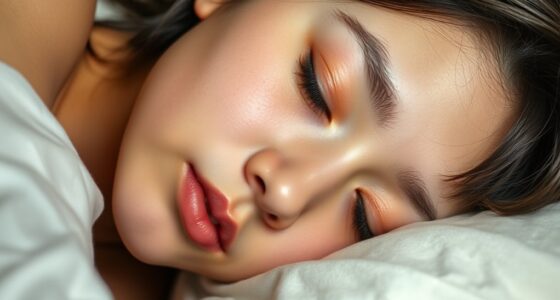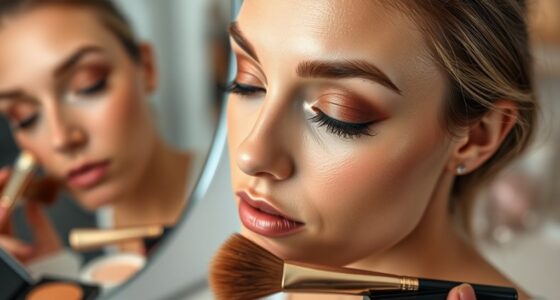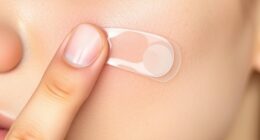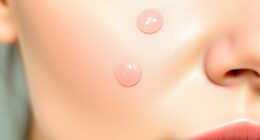Sleep masks can definitely help your sight by improving your sleep quality and promoting eye health. By blocking ambient light, they enhance melatonin production, leading to deeper sleep and better visual function. Quality sleep aids in ocular recovery and reduces risks associated with sleep deprivation, such as dry eye syndrome. Choosing the right mask guarantees maximum benefits, so you can wake up feeling refreshed and ready. Discovering more about eye masks might surprise you with added tips!
Key Takeaways
- Eye masks block ambient light, promoting deeper sleep and aiding in ocular recovery for improved visual function.
- Quality sleep enhances contrast sensitivity and overall visual performance, reducing the risk of eye-related issues.
- Chronic sleep deprivation can increase risks of conditions like dry eye syndrome and glaucoma, making sleep masks beneficial for eye health.
- Consistent use of eye masks regulates melatonin production, supporting healthy sleep cycles essential for visual recovery.
- Personalized comfort and fit of sleep masks can reduce light exposure, improving overall sleep quality and visual function.
Understanding the Role of Sleep Masks in Eye Health

When you wear a sleep mask, you’re not just blocking out unwanted light; you’re also promoting your eye health. Sleep masks effectively block ambient light, creating a dark environment that helps reduce eye strain and fatigue, leading to improved sleep quality.
Research shows that consistent use of eye masks can enhance deeper sleep, which is essential for recovery and reducing conditions like dry eyes.
Consistent use of eye masks promotes deeper sleep, crucial for recovery and alleviating issues like dry eyes.
Additionally, silk eye masks protect the delicate skin around the eyes from friction and bacteria on pillowcases, minimizing irritation.
By regulating melatonin production, sleep masks play a significant role in maintaining healthy circadian rhythms, which indirectly benefits your eye health.
In short, using sleep masks is a simple yet effective way to support your overall well-being.
Benefits of Using Eye Masks for Sleep Quality

Using an eye mask can markedly enhance your sleep quality by effectively blocking out ambient light. This reduction in light exposure helps stabilize your sleep patterns, making it easier for you to fall asleep and stay asleep.
One of the key benefits of wearing an eye mask is its ability to promote melatonin production, which is essential for deeper sleep and overall well-being. Research shows that using an eye mask can also boost cognitive performance, improving memory retention and reaction times.
Plus, eye masks are a cost-effective way to enhance your sleep environment without needing blackout curtains. With consistent use, you’ll likely notice significant improvements in your overall sleep quality and daytime alertness.
How Sleep Masks Affect Melatonin Production
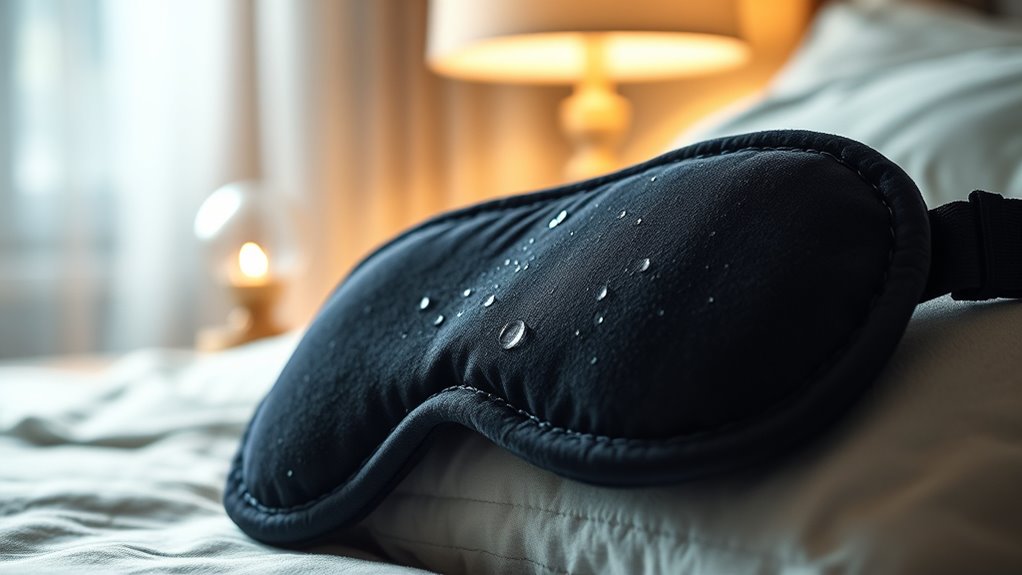
Because sleep masks effectively block ambient light, they play an essential role in stimulating melatonin production, the hormone that regulates your sleep cycles.
When you use eye masks, you can benefit in several ways:
- Enhanced Melatonin Levels: Sleep masks promote melatonin production, helping you achieve deeper, more restorative sleep.
- Reduced Disrupted Sleep Patterns: By eliminating light exposure, you minimize interruptions that can affect your circadian rhythms, leading to improved sleep quality. Additionally, improving indoor air quality can further enhance your sleep environment.
- Improved Mental Alertness: A well-rested mind leads to better cognitive performance during waking hours.
Additionally, consistent use of sleep masks can help protect your energy and improve overall well-being by fostering a more restful sleep environment.
The Relationship Between Sleep and Visual Function
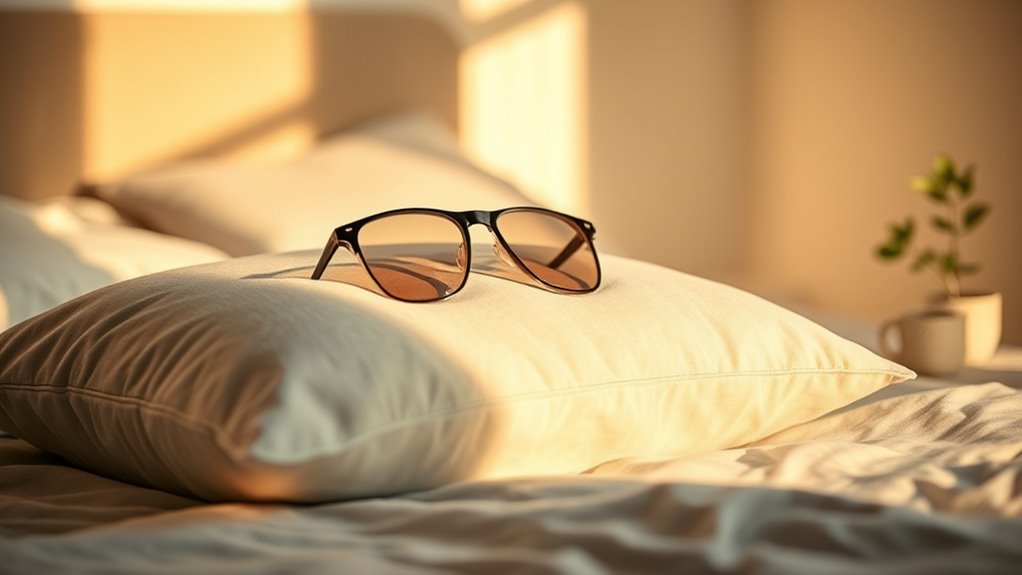
Quality sleep isn’t just about feeling rested; it directly impacts your vision.
When you block out light with sleep masks, you enhance your sleep quality, which can reduce eye strain and improve visual performance.
Understanding how sleep affects your eyes can help you take better care of your overall eye health.
Sleep Quality and Vision
While you mightn’t realize it, the quality of your sleep plays a crucial role in your visual function. Here’s how sleep impacts your eyes:
- Contrast Sensitivity: Poor sleep can lead to a decline in contrast sensitivity, making it harder to see differences in shades and brightness. Studies have shown that positive thinking can improve overall mental health, which indirectly supports better sleep. Furthermore, individuals experiencing emotional dysregulation may find it especially challenging to maintain consistent sleep patterns.
- Ocular Recovery: Quality sleep promotes ocular recovery, allowing your eyes to repair and rejuvenate after a long day. During sleep, the body undergoes various restorative processes that are essential for overall eye health.
- Eye Health Risks: Chronic sleep deprivation increases the risk of conditions like dry eye syndrome and even glaucoma. Additionally, maintaining overall health during pregnancy, including regular prenatal check-ups, can also contribute to better eye health.
Prioritize rest for ideal eye function!
Light Exposure Effects
When you expose yourself to light at night, it can disrupt your natural sleep cycle by suppressing melatonin production, leading to poorer sleep quality. This disruption can impair visual functions, such as contrast sensitivity and visual acuity, resulting in increased eye fatigue.
By using an eye mask, you can effectively block light exposure and promote deeper, more restorative sleep. Improved sleep quality helps mitigate the negative effects of artificial light and supports ideal visual health.
Moreover, better sleep can enhance cognitive functions, including visual processing. So, if you’re struggling with sleep and eye strain, consider that an eye mask can help create a darker environment, allowing you to sleep better and protect your vision in the long run.
Eye Health Benefits
Sleep plays a significant role in maintaining eye health, as it allows your eyes to recover from daily strain and supports overall visual function.
Wearing an eye mask can help improve your sleep quality by blocking out light, leading to several benefits for your eye health:
- Reduced Eye Strain: Quality sleep helps prevent conditions like dry eyes and alleviates strain caused by screen time. Additionally, using comfort solutions like memory foam sleep masks can enhance your overall sleep experience.
- Lower Intraocular Pressure: Adequate rest decreases the risk of glaucoma, as sleep deprivation can increase pressure in your eyes.
- Enhanced Visual Processing: Improved sleep quality boosts your cognitive performance, including reaction times and visual tasks.
Additionally, practicing regular physical activity can enhance sleep quality, further benefiting your overall eye health.
Potential Risks of Using Eye Masks During Sleep
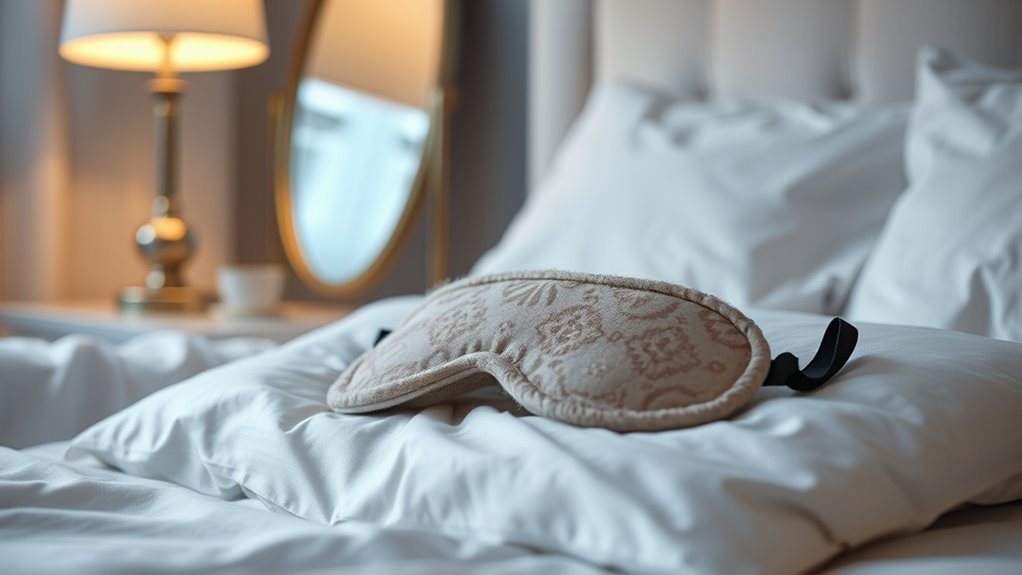
How can something as simple as an eye mask pose risks during sleep? While they help block light, tight-fitting masks can exert pressure on your eyes, leading to blurred vision upon waking.
If you use an unclean mask, the buildup of oils and bacteria increases the risk of skin irritation and eye infections. You might also experience allergic reactions from the materials, causing discomfort.
Additionally, if your eye mask isn’t properly fitted, it could create light gaps, disrupting sleep quality and affecting your overall restfulness.
To minimize these risks, maintain good hygiene by washing your mask regularly, ensuring it fits well, and checking for any signs of skin irritation or discomfort.
Prioritize your eye health while enjoying the benefits of sleep shades.
Choosing the Right Eye Mask for Optimal Benefits
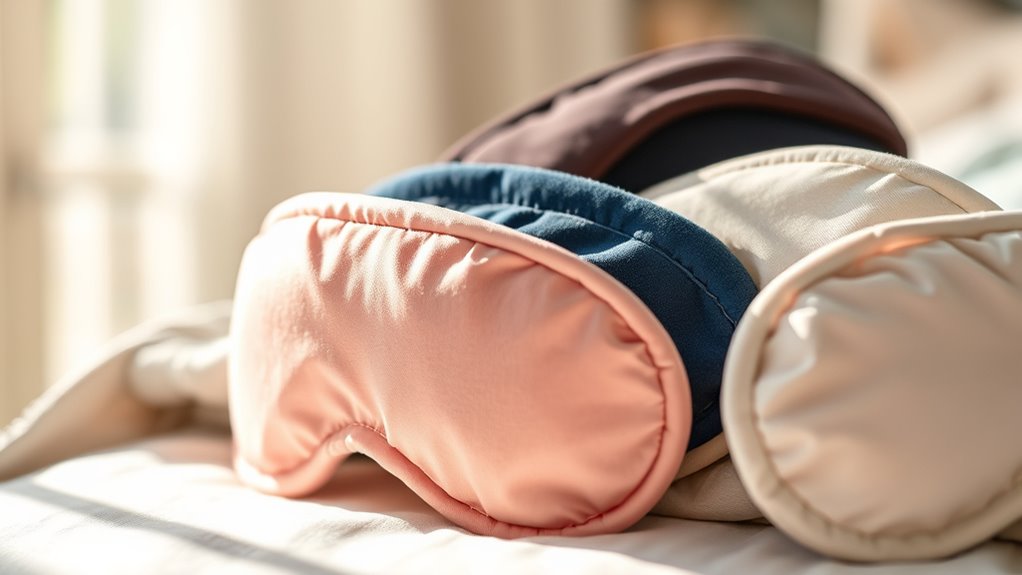
What should you consider when selecting the perfect eye mask? To guarantee you get ideal benefits, think about these key factors:
- Light-blocking ability: Choose dark colors and full-coverage designs to enhance sleep quality, similar to black-out curtains.
- Breathable fabrics: Look for materials like silk for comfort; they can also help retain moisture and reduce wrinkles. Additionally, maintaining a clean environment with an air purifier can significantly improve overall sleep quality by reducing allergens and pollutants.
- Adjustable straps: These offer a customizable fit, minimizing pressure points and light leakage.
Additionally, consider contoured masks that fit your face shape and explore weighted masks for added comfort. Regular filter replacement can also improve your sleep environment by ensuring cleaner air, as air purifiers effectively reduce allergens and pollutants.
Each person’s individual needs vary, so experiment to find the eye mask that suits you best. With the right choice, you’ll enhance your sleep experience considerably.
Frequently Asked Questions
Are There Any Benefits to Sleeping With an Eye Mask?
Using an eye mask while sleeping offers several benefits. It blocks out light, helping you fall into a deeper, more restorative sleep.
This improved sleep quality enhances your alertness and cognitive performance, making you feel more refreshed during the day.
Plus, if you travel frequently, an eye mask creates a dark environment, reducing disruptions from light and noise.
Regular use can also minimize skin issues, like moisture loss and the appearance of wrinkles.
Can Sleep Masks Affect Vision?
Did you know that about 30% of people experience temporary blurred vision after using sleep masks?
While they’re designed to block light, wearing them too tightly can cause discomfort and visual issues. If you notice irritation or pressure around your eyes, it’s best to adjust or replace the mask.
Keeping your sleep mask clean is essential, too, as it prevents allergens and bacteria that could impact your eyes and overall comfort.
What Are the Disadvantages of Sleeping Eye Masks?
Sleeping eye masks can have several disadvantages. They might cause blurred vision when you wake up due to pressure on your eyes, especially if worn too long.
You could also experience skin irritation or breakouts from unwashed masks, which can harbor bacteria. If you’re sensitive to certain materials, you might face allergic reactions.
Additionally, the discomfort from tight-fitting masks can disrupt your sleep, leading to restless nights and reduced comfort overall.
What Are the Benefits of Eye Cooling Mask?
Eye cooling masks offer several benefits that can enhance your overall well-being.
They reduce puffiness and dark circles by constricting blood vessels and decreasing inflammation. If you spend long hours in front of screens, these masks promote relaxation and relieve eye strain.
Their cooling effect can improve skin hydration and elasticity, giving you a more youthful appearance.
Plus, regular use may help enhance sleep quality and reduce insomnia symptoms, making them a great addition to your routine.
Conclusion
In the end, sleep masks can be your cozy cocoon, wrapping you in darkness for a restful night. They not only enhance sleep quality but may contribute to your overall eye health. By promoting melatonin production, they help you drift into a deeper slumber, which is essential for maintaining good vision. Just remember to choose the right mask to reap the full benefits while keeping potential risks at bay. Sweet dreams and sharper sights await!




